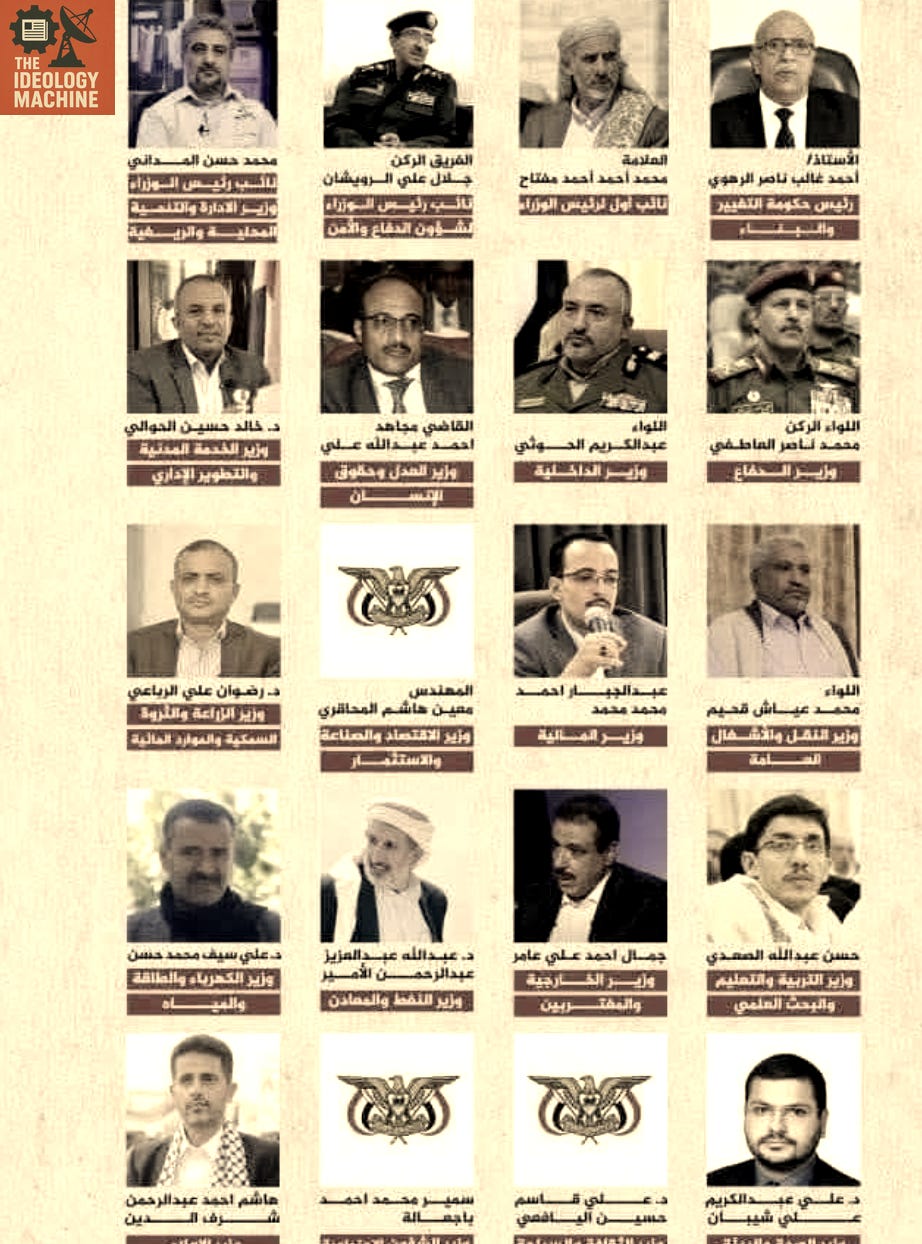What Dies and What Doesn’t in Yemen
Israel’s strike on Sana’a killed the Houthis’ prime minister and a dozen ministers. What it didn’t kill is the system of fear, illusion, and Iranian power that keeps Yemen trapped.
The full scope of Thursday's Israeli strike on Sana'a became clearer today as the Houthis confirmed the death of their Prime Minister (August 30, 2025). Despite the group's efforts to minimize the strike's impact, casualty reports continued to emerge throughout the day, with the list of killed or injured officials growing as families posted condolences on social media rather than waiting for official confirmation. Much of the confirmation came not from official channels, but from families offering condolences on social media.

Some of those targeted, I had wanted to see prosecuted… to hear them account for the crimes woven into their governance: the recruitment of children, the persecution of minorities, the dehumanization of Jews, the erasure of women, the theft of aid, the detention of opposition, and the fanaticism they institutionalized as policy. They grew so comfortable in the structures of power that they began to believe they could coexist among the very people they oppressed.
What struck me most was how many of these names ultimately didn’t matter… not to the Houthis, and not to the population they claim to govern. They were senior enough to hold titles, yet they had no significant influence on real power. And while many Yemenis felt vindicated in seeing their jailors struck down, my own feelings are conflicted. There is no justice here…. only the continuity of domination, chaos, and a culture of fear that reproduces itself with every cycle of violence. This is what dies in Yemen: names, titles, placeholders. What doesn’t die is the system that endures them.
Long story short:
The Houthis’ prime minister was killed, along with roughly a dozen cabinet members.
The Houthis continue to vow more terror against Yemenis and Israelis.
My analysis? Thinking about Yemen and the Yemenis, the ideology and the culture, I am concerned. The grim reality is that even if Abdulmalek al-Houthi himself is killed, his dangerous legacy will endure. It is a legacy built on division and injustice, sustained not by individuals but by the system itself… one that thrives on fear, exclusion, and the illusion of governance.
Yemenis may think that the end is near, but the driver of this conflict is external, and it has always been the Islamic Republic of Iran. That part isn’t complicated. What is complicated is how, for more than a decade, dominant policy narratives pretended otherwise, and in the meantime, it was Yemenis who paid the price.
And in this sense, Abdulmalek’s role within the IRGC’s orbit is emblematic. He is not an autonomous actor but a proxy, instrumentalized to extend their reach. Whatever ambitions he claims for himself, even projects far removed from politics, are realized only because they are folded into that machinery. The mask of autonomy he attempts to wear every day conceals dependency; he is reduced to a function. His stance toward Yemen is not stewardship but detachment: après moi, le déluge. Otherwise, why would he send many ten-year-olds to fight “Israel” in Saudi Arabia? What matters for him is not the survival of the society he dominates, but the continuity of the system that has already claimed him.
This ideological entrenchment distinguishes Yemen from other Iranian proxy relationships. When Assad fell in Syria, Iran lost not just a strategic partner but much of its ideological foothold because Assad's relationship with Iran was ultimately transactional, maintained through the state apparatus rather than a genuine popular movement. The Houthis represent something more dangerous: an ideological project that Iran has successfully grafted onto existing Yemeni grievances and tribal structures. They've built not just military dependency but a worldview that has taken root at the grassroots level, making this proxy relationship far more resilient than the state-to-state partnerships Iran maintained elsewhere.
Every day, I grow more certain that the real answer lies in the freedom of the people of Iran. Until then, Yemen will continue to show us what dies: figureheads and facade, and what doesn’t: the machinery of fear and the legacy of division. The key to Yemen's future isn't in Sana'a; it's in Tehran.

